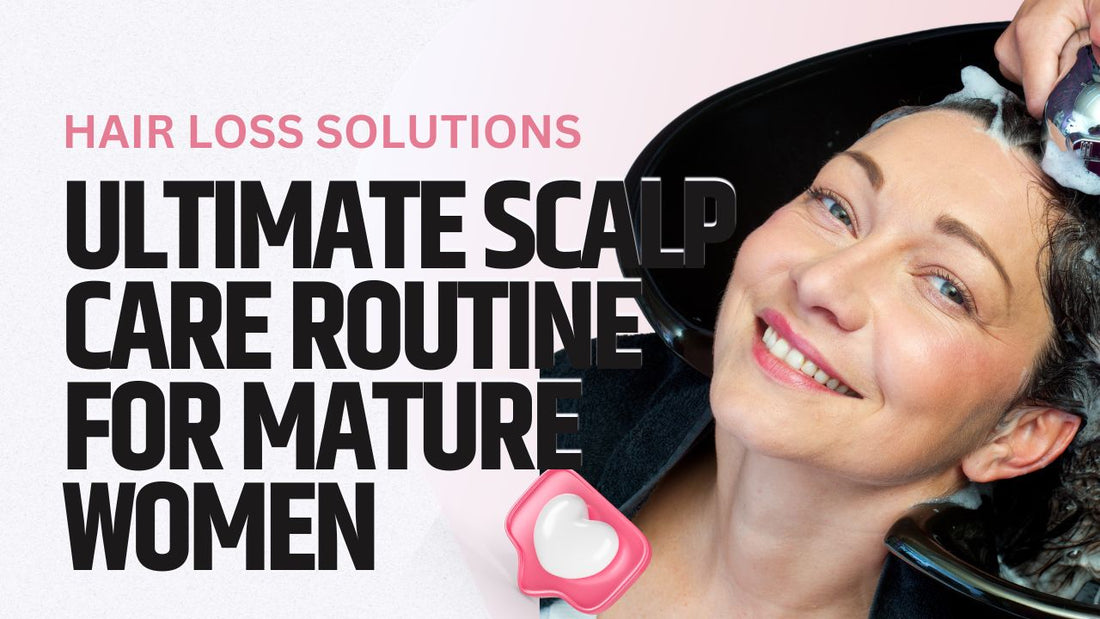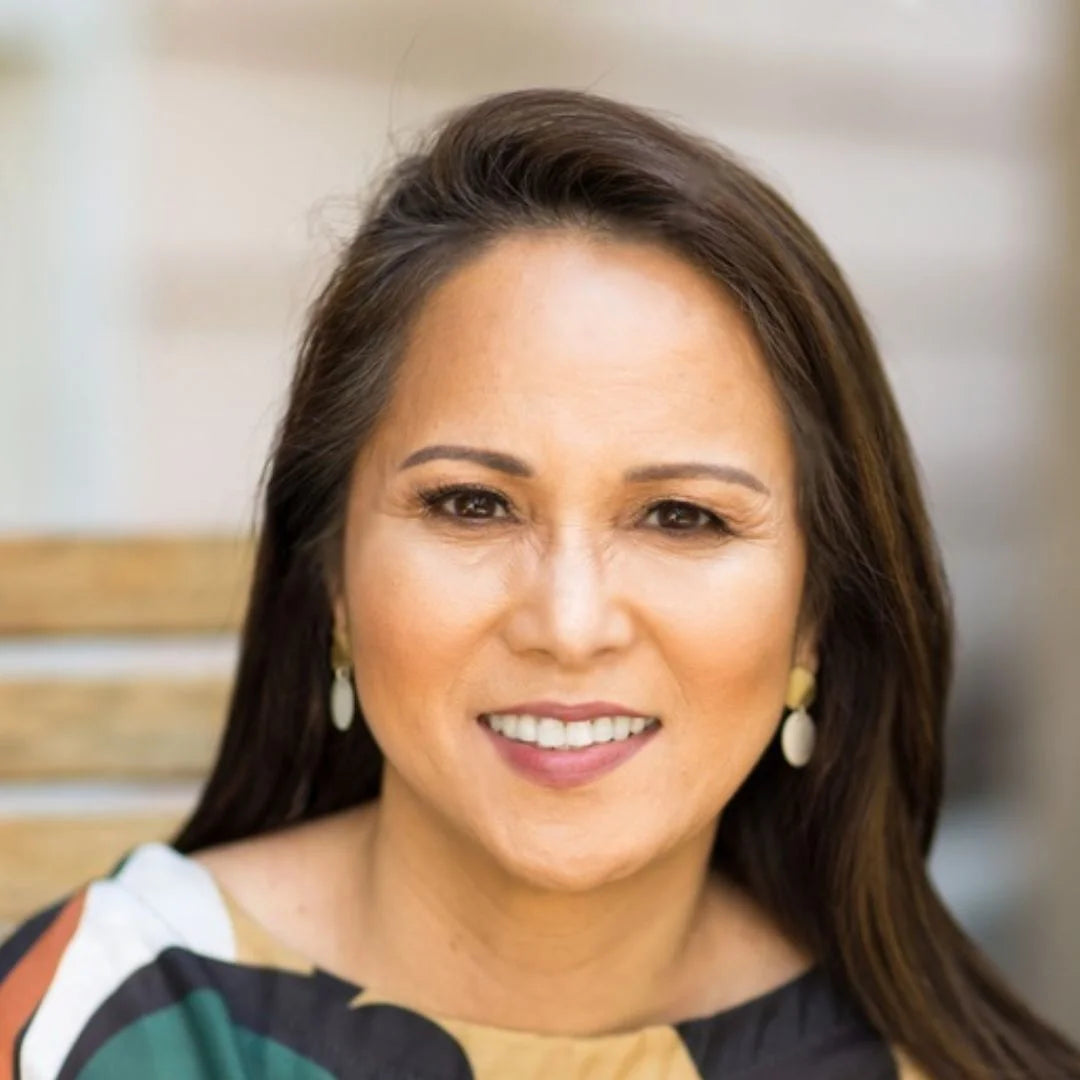
Ultimate Scalp Care Routine for Mature Women
Share
As the seasons of life evolve, our skin undergoes transformations, a phenomenon that extends to the delicate ecosystem of the scalp. Emphasizing mature women scalp care is essential, as a healthy scalp lays the foundation for strong, vibrant hair. This article is centered around mature women scalp care, aiming to reveal the ultimate scalp care routine specifically tailored to meet their unique needs. We are committed to guiding you through the essential elements of mature women scalp care, from the basics of nurturing your scalp to advanced care strategies, complemented by real-life transformations that highlight the significance of a devoted scalp care regimen.

The Science of Aging Scalp and Hair
Changes in Hair and Scalp as We Age
Our scalp undergoes significant changes as we mature. Hair follicles may shrink, produce less pigment, and the rate of hair growth can slow down. Additionally, the scalp's skin can become drier and more sensitive, necessitating a shift in our hair care approach. Understanding these changes is the first step toward crafting a scalp care routine that adapts to these natural processes.
Common Scalp Issues for Mature Women
Mature women often face specific scalp challenges, such as dryness, thinning hair, and sensitivity. Each of these issues requires a careful approach to prevent irritation and promote a healthy scalp environment. Addressing these common concerns is crucial for maintaining not only the health of the scalp but also the confidence that comes with it.

Foundations of a Scalp Care Routine
The Role of Diet and Hydration
A balanced diet rich in vitamins, minerals, and antioxidants is as beneficial to your scalp as it is to your body. Hydration also plays a critical role in maintaining the elasticity and health of the scalp's skin. Including plenty of water and nutrient-dense foods in your diet can significantly impact the condition of your scalp and hair.
Gentle Cleansing Practices
Choosing the right shampoo is vital for mature scalps. Products designed for gentle cleansing without stripping natural oils can help maintain the scalp's delicate balance. We'll explore how often to shampoo and what ingredients to look for to keep your scalp clean and nourished.
The Importance of Moisturizing
Just like the skin on our face, the scalp needs moisture to stay healthy. We will delve into the best ways to moisturize the scalp and why it's an essential step in every mature woman's hair care routine.
Advanced Scalp Care Strategies
Embarking on a journey of advanced scalp care requires not only knowledge but also a dedication to applying that knowledge regularly. As we age, our scalp demands more attention and targeted treatments to maintain its health.
Exfoliation: Why and How Often
Exfoliation is not just for the face; the scalp benefits greatly from this practice as well. Removing dead skin cells, product buildup, and excess oil can rejuvenate the scalp, paving the way for healthier hair growth. For mature women, a gentle exfoliation routine can be implemented once or twice a month, depending on scalp sensitivity and individual needs.
Targeted Scalp Treatments
Serums and oils specifically formulated for the scalp can deliver vital nutrients and hydration directly where it's needed. Ingredients like hyaluronic acid, peptides, and antioxidants can address the signs of scalp aging, providing a more youthful and fertile ground for hair to thrive.
Massages for Circulation Enhancement
Scalp massages are not only relaxing but also stimulate blood flow, bringing more nutrients and oxygen to the hair follicles. Incorporating a gentle massage into your daily routine, perhaps while applying your scalp serum or oil, can turn a simple step into a luxurious, beneficial ritual.
Proactive Rosemary Hair Booster Oil in Scalp Care
Benefits of Proactive Rosemary Hair Booster Oil
Introducing specialized products such as Proactive Rosemary Hair Booster Oil into your scalp care routine can provide multiple benefits. Rich in nutrients that are known to stimulate hair growth and improve scalp health, this oil can be particularly effective for mature women experiencing thinning or dryness.
Integrating Proactive Rosemary Hair Booster Oil into Your Routine
For the best results, the oil should be massaged into the scalp regularly. This not only ensures that the active ingredients are absorbed but also enhances circulation through massage. We'll explore the specifics of how to integrate this powerful product into your daily and weekly scalp care practices.
Addressing Specific Scalp Concerns
Dry Scalp and Dandruff
Dry scalp and dandruff can be more than just an annoyance; they can be indicative of a scalp out of balance. We'll discuss the specific ingredients to look for in products that can help manage these issues and offer home remedies that can provide relief.
Sensitive Scalp and Irritation
A sensitive scalp requires a delicate touch and gentle products free from harsh chemicals. In this section, we'll recommend soothing treatments and protective steps you can take to reduce irritation and promote scalp comfort.
Hair Thinning and Loss
Hair thinning and loss are common concerns for mature women. While entirely reversing these conditions may not be possible, certain scalp care practices can help manage and mitigate their effects. We'll look at how a well-maintained scalp can support the healthiest hair possible for your individual situation.

Lifestyle Adjustments for Scalp Health
Adopting a holistic approach, lifestyle adjustments play a pivotal role in maintaining a healthy scalp. It's not only about what you apply directly to your scalp but also how you live your life.
Stress Management and Scalp Health
Stress can have a direct impact on the condition of your scalp, often leading to issues like hair loss and scalp sensitivity. Incorporating stress-reducing activities such as yoga, meditation, or even regular walks can help alleviate stress levels, potentially improving scalp health.
Exercise and Scalp Vitality
Regular physical activity increases blood flow throughout the body, including the scalp. This enhanced circulation delivers more nutrients and oxygen to the hair follicles, which can improve hair growth and scalp health. Encouraging even moderate exercise can be beneficial for mature women looking to improve their scalp condition.

Protecting the Scalp from Environmental Factors
Just as we protect our skin from the sun and pollution, the same should be done for our scalp. Wearing hats, using products with SPF protection, and avoiding harsh environmental conditions can help maintain the integrity of the scalp.
Daily, Weekly, and Monthly Scalp Care Plans For Mature Women
Creating a Scalp Care Schedule
A consistent routine is key to achieving and maintaining a healthy scalp. We’ll outline a comprehensive schedule that includes daily, weekly, and monthly care practices, ensuring that you can give your scalp the attention it deserves without feeling overwhelmed.

Transformations Through Scalp Care For Mature Women
Testimonials and Success Stories
The journey to a healthy scalp is personal and unique for every individual, yet the end goal is universal — a desire for strong, vibrant hair that reflects one’s inner vitality. Let's delve into the inspiring stories of mature women who have seen transformative results through diligent scalp care.
Maria’s Journey to Scalp Revitalization
Meet Maria, a 58-year-old who began noticing her hair thinning and scalp becoming increasingly dry. Frustrated with the countless products that promised results but didn't deliver, Maria decided to take a more methodical approach to her scalp care. She began with gentle exfoliation, using a soft-bristled brush to stimulate her scalp and remove dead skin cells. She incorporated a hydrating scalp mask into her weekly routine and saw a noticeable difference within a few months. Maria shares, “My hair feels stronger, and I've noticed new growth. More importantly, my scalp doesn't itch or flake anymore. It's been a game-changer for me.”
Evelyn's Fight Against Dry Scalp
Evelyn, 65, battled with a dry, itchy scalp for years. It wasn't until she discovered the importance of hydration — both internally and externally — that she began to see a change. Evelyn increased her water intake and introduced a scalp oil enriched with natural ingredients into her nightly routine. “I massage my scalp every night before bed,” says Evelyn. “Not only has it become a relaxing ritual, but my scalp has transformed. It’s no longer tight or itchy, and my hairdresser commented on how much thicker my hair is looking!”
Expert Insights and Tips
While personal experiences are enlightening, expert advice can further demystify scalp care. Dr. Thompson, a dermatologist specializing in hair and scalp health, emphasizes the importance of customization in scalp care. “No single routine works for everyone,” Dr. Thompson explains. “It’s crucial to listen to your scalp and adjust your routine as needed. If you’re experiencing dryness, for instance, reduce the frequency of shampoos and introduce more moisturizing products. For those with oily scalps, a balancing shampoo and occasional clay masks can work wonders.”
Trichologist Linda Smith advises her mature clients to not overlook the role of diet and lifestyle. “Your scalp is an extension of your skin,” she says, “and it requires the same nutritional building blocks to stay healthy. Omega-3 fatty acids, vitamins A and C, and proteins are essential for maintaining scalp health. Supplements can help, but the best source is a well-rounded diet.”

Through the combination of heartfelt testimonials and expert advice, this section aims to not only inspire but also educate. These stories and tips serve as a testament to the power of a dedicated scalp care routine and the beauty of embracing the maturity of one’s natural hair.
A Commitment to Scalp Health: Your New Beauty Essential
Recognizing the integral role scalp health plays in your overall beauty regimen is crucial. As we conclude our comprehensive guide, we emphasize the importance of making a commitment to your scalp health, seeing it not as an optional extra but as an essential part of your self-care routine.
FAQs
Before we wrap up, let’s address some frequently asked questions to clear up any remaining uncertainties and ensure you’re fully equipped to take control of your scalp health.
Q: How often should I exfoliate my scalp?
A: For mature women, gentle scalp exfoliation can be done once or twice a month. The key is to use a product that is designed for sensitive scalp skin. If you notice any irritation or discomfort, reduce the frequency or consult with a dermatologist for a product that suits your specific skin type.
Q: Can diet really affect the health of my scalp?
A: Absolutely. The scalp, like any other skin on your body, can be affected by your nutritional intake. A diet rich in omega-3 fatty acids, antioxidants, vitamins, and minerals can support scalp health by providing the nutrients needed for healthy skin and hair follicles.
Q: Is it necessary to use a conditioner on the scalp, or should it just be applied to the hair?
A: While traditionally conditioners are applied mainly to the hair, especially on the ends, some conditioners are formulated to be scalp-friendly and can be applied from root to tip. Look for products labeled as 'scalp conditioners' or 'scalp treatments' that are designed to moisturize the scalp without causing buildup.
Q: What's the best way to protect my scalp from environmental damage?
A: Protecting your scalp from the environment can be as simple as wearing a hat or scarf to shield it from the sun's UV rays, which can be damaging over time. Additionally, using hair products with built-in UV protection can help, as can avoiding excessive pollution and harsh weather by covering your head.
Q: How can stress management improve my scalp health?
A: Stress can manifest physically, and one of the areas it can affect is your scalp, potentially leading to conditions like telogen effluvium, which is a form of stress-induced hair loss. Managing stress through relaxation techniques, exercise, and adequate sleep can mitigate these effects and promote a healthier scalp.
Q: I have a sensitive scalp. Are there specific ingredients I should avoid in scalp care products?
A: Yes, if you have a sensitive scalp, you should avoid products containing alcohol, sulfates, and artificial fragrances, which can be drying and irritating. Instead, look for hypoallergenic products with natural soothing ingredients like aloe vera, chamomile, and rosemary oil.
Q: Will scalp massages help with hair thinning?
A: Scalp massages can improve circulation, which increases the flow of blood and nutrients to the hair follicles. While this may not reverse hair thinning, it can improve the health of your existing hair and potentially encourage growth.
Q: What is the Proactive Rosemary Hair Booster Oil, and how does it fit into my scalp care routine?
A: The Proactive Rosemary Hair Booster Oil is a product enriched with ingredients like rosemary oil, which is known to stimulate hair growth. It can be used as part of your regular scalp care routine, ideally massaged into the scalp to nourish it and improve circulation.
Conclusion: Celebrating the Maturity of Beauty with Scalp Care
In celebrating the maturity of your beauty, it's clear that scalp care is not a luxury but a necessity. By adopting the ultimate scalp care routine, you honor your body's changes with grace and empower yourself to look and feel your best. As you integrate these practices into your life, remember that caring for your scalp is a form of self-respect that radiates outward in the form of lustrous, healthy hair.


















